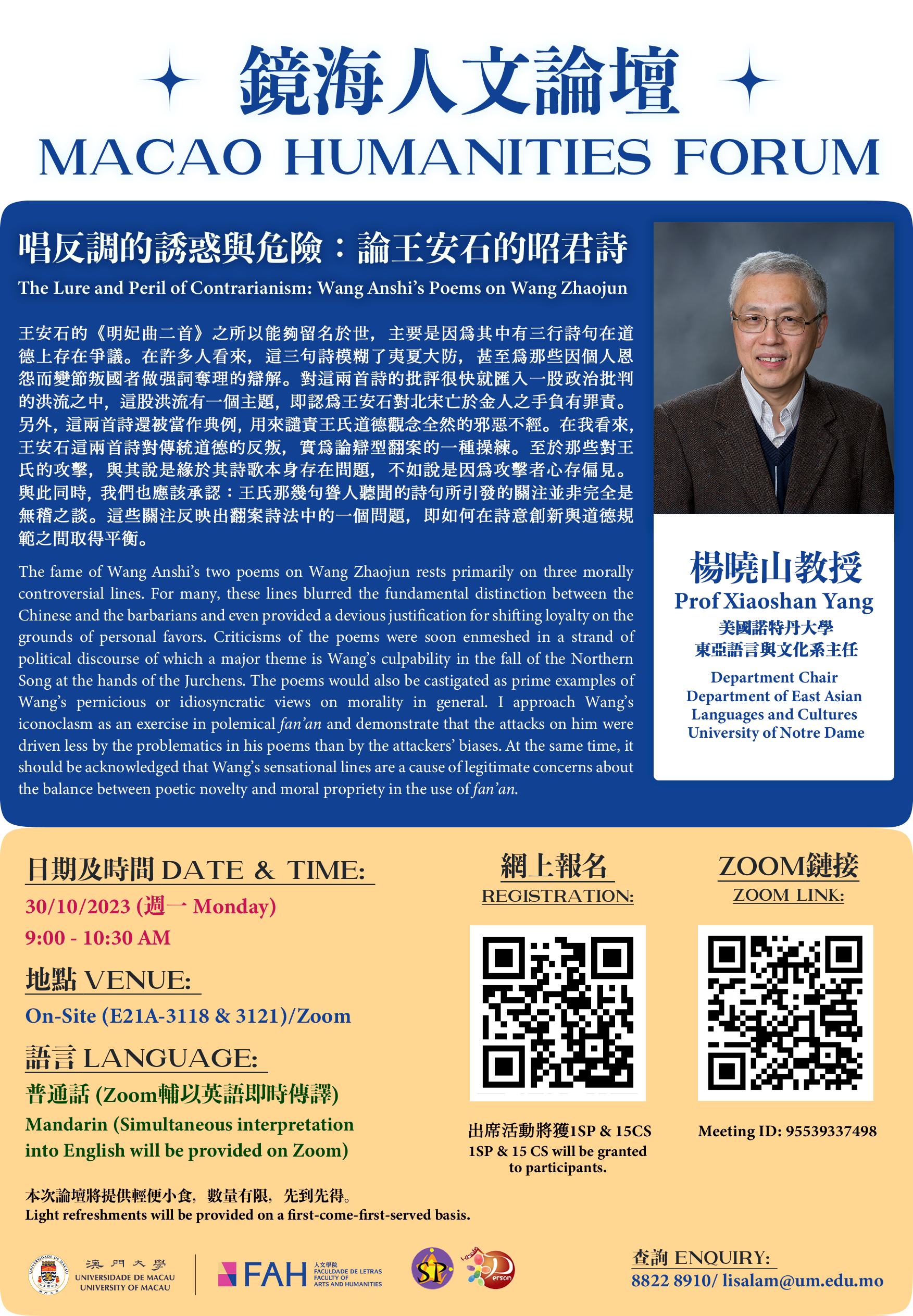

【Macao Humanities Forum】 The Lure and Peril of Contrarianism: Wang Anshi’s Poems on Wang Zhaoju by Prof Xiaoshan Yang from the University of Notre Dame
2023-10-30 @ 9:00 am ~ 10:30 am
We are very pleased to announce that the 1st Lecture of the FAH Macao Humanities Forum (2023/2024) will be held on 30 Oct 2023. The forum aims to provide a platform for world-renowned scholars from diverse humanities fields to share their research with the FAH community and other UM scholars. All members of the UM community are cordially invited to this splendid event.
In this upcoming forum, we are honored to have Professor Xiaoshan Yang as our guest speaker to deliver an online lecture on the topic “The Lure and Peril of Contrarianism: Wang Anshi’s Poems on Wang Zhaojun” 唱反調的誘惑與危險:論王安石的昭君詩. Prof Yang is the Department Chair and Professor in the Department of East Asian Languages and Cultures at the University of Notre Dame. He received his Ph.D. in Comparative Literature from Harvard University. His representative publications include To Perceive and to Represent: A Comparative Study of Chinese and English Poetics of Nature Imagery, Metamorphosis of the Private Sphere: Gardens and Objects in Tang-Song Poetry (Harvard 2003), and Wang Anshi and Song Poetic Culture (Harvard 2021). His research has been recognized with grants by the National Endowment for the Humanities and the American Council of Learned Societies. His research interests include classical Chinese poetry, language and poetics.
Details of the forum are as follows:
Speaker: Professor Xiaoshan Yang 楊曉山教授
Topic: The Lure and Peril of Contrarianism: Wang Anshi’s Poems on Wang Zhaojun 唱反調的誘惑與危險:論王安石的昭君詩
Date: 30 Oct 2023 (Mon)
Time: 09:00 – 10:30 AM
Venue: On-Site (E21A-3118 and 3121) / ZOOM (Link:https://umac.zoom.us/j/95539337498)
Language: Mandarin (with simultaneous interpretation into English on Zoom)
*Light refreshments will be provided on a first-come-first-served basis
Please register for the forum by 26 Oct 2023 (Thur) via https://umac.au1.qualtrics.com/jfe/form/SV_9mh7aTNTGbTMYo6
Abstract:
The fame of Wang Anshi’s two poems on Wang Zhaojun rests primarily on three morally controversial lines. For many, these lines blurred the fundamental distinction between the Chinese and the barbarians and even provided a devious justification for shifting loyalty on the grounds of personal favors. Criticisms of the poems were soon enmeshed in a strand of political discourse of which a major theme is Wang’s culpability in the fall of the Northern Song at the hands of the Jurchens. The poems would also be castigated as prime examples of Wang’s pernicious or idiosyncratic views on morality in general. I approach Wang’s iconoclasm as an exercise in polemical fan’an and demonstrate that the attacks on him were driven less by the problematics in his poems than by the attackers’ biases. At the same time, it should be acknowledged that Wang’s sensational lines are a cause of legitimate concerns about the balance between poetic novelty and moral propriety in the use of fan’an.

